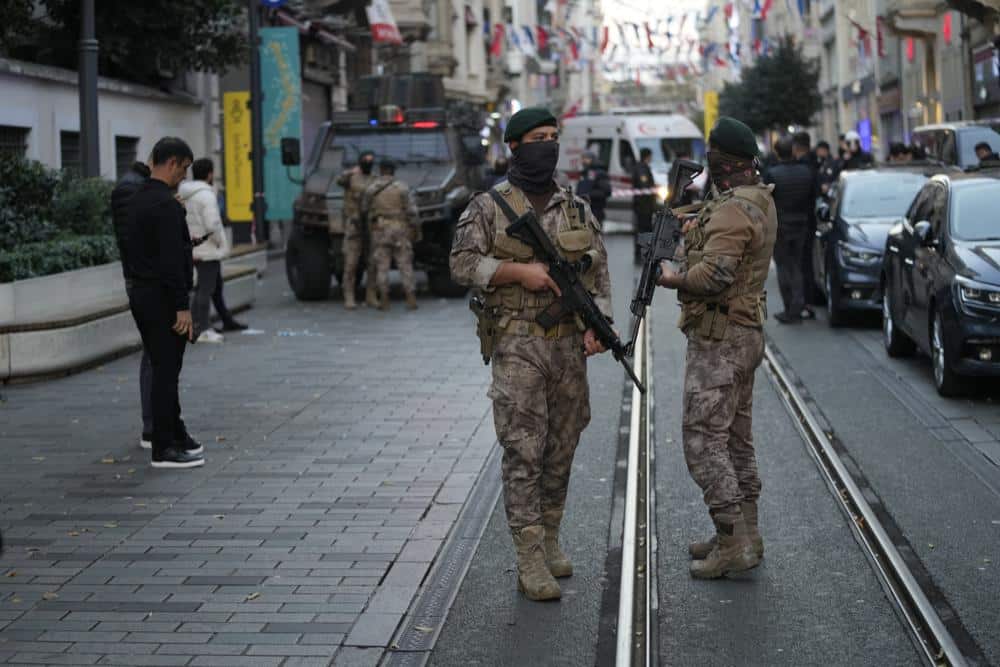Turkey’s interior minister has said that a suspect was arrested in connection with a bombing in a busy Istanbul shopping street that killed six people and that Kurdish militants in northern Syria were responsible. 21 others were previously detained.
A woman sat on a bench on İstiklal Avenue, the most popular pedestrian thoroughfare in Istanbul, for 45 minutes, according to justice minister Bekir Bozdağ. The bomb exploded moments after she left, killing eight people and injuring 79 others.
Interior Minister Suleyman Soylu said early Monday that the attack was planned in a northern Syrian city with a significant Kurdish population, blaming the Kurdistan Workers’ Party and the People Defense Units for the attack.
Ayn al-Arab in northern Syria, where the PKK/YPG has its Syrian headquarters, ordered the deadly terror attack he said.
No group has said it was behind Monday’s attack in central Istanbul, which was blamed on Kurdish militants or Islamic State-linked attackers.
The PKK has been branded a terrorist group by Ankara, Washington, and the EU as a result of its decades-long insurgency for Kurdish self-rule in south-eastern Turkey. The YPG is connected to the PKK, but it is a part of the US-backed Syrian Democratic Forces fighting against Islamic State militants in northern Syria.
Fahrettin Altun, a presidential communications official, alluded to the potential negative effect on US-Turkey relations due to Ankara’s longstanding frustration with Washington’s support for Kurdish fighters in northern Syria.
Responding to a question on whether Turkey would establish a safe zone in Syria similar to the one it created in northern Iraq, Çelik said the international community must take note of terror strikes against civilians. He added that countries which support terror organisations directly or indirectly must discontinue doing so if they wish to maintain good relations with Turkey.
Turkish military operations regularly target the PKK in northern Iraq, while Ankara’s refusal to enter Nato because of its leniency towards the group has been blocked by Sweden.
Before departing for the G20 summit in Bali on Tuesday, Recep Tayyip Erdoğan referred to the blast as a “treacherous attack”, saying, “Those responsible will be punished.”
An explosion on İstiklal Avenue, a crowded street frequented by both locals and foreign visitors, near Taksim Square, Istanbul, Turkey, was reported Tuesday. The location is just over 0.5 miles away from Galata Tower, which sits on the Bosphorus waterway.
Footage posted online at the moment of the attack showed people running for cover as a large fireball loomed overhead. Shoppers who had previously been strolling in the sun clutched each other in fear before turning to run away.
Because of the risk of societal panic, RTÜK, Turkey’s media ombudsman, banned coverage of the explosion, prohibiting broadcasters from showing the moment the blast occurred or its immediate aftermath, to “avoid broadcasts that may create fear, panic, and turmoil in society and may benefit terrorist organisations.”
NetBlocks, a web freedom monitoring organisation, said network data indicated that the Turkish government was restricting access to social media platforms including Twitter, Instagram, YouTube, and Facebook after the attack. According to Alp Toker, the founder of NetBlocks, restricting information access is detrimental in times of emergency. Restricting social media after security incidents and attacks, research shows that information restriction leads to more misinformation, he said.
A new law prohibiting “disinformation” has recently been passed by the Turkish parliament, under which social media users or journalists found guilty of breaking it could be imprisoned for up to three years. In connection with the attack, the head of RTÜK, Ebubekir Şahin, asked citizens to avoid spreading misinformation. We are following the situation closely,” he said. “Please do not rely on information from unidentified sources. Let us rely on trustworthy information. Let us not distribute false info unintentionally.”
Between 2015 and 2017, Islamic State and outlawed Kurdish groups hit Turkey with a string of deadly bombings.
Image Credit: AP Photo/Francisco Seco



















